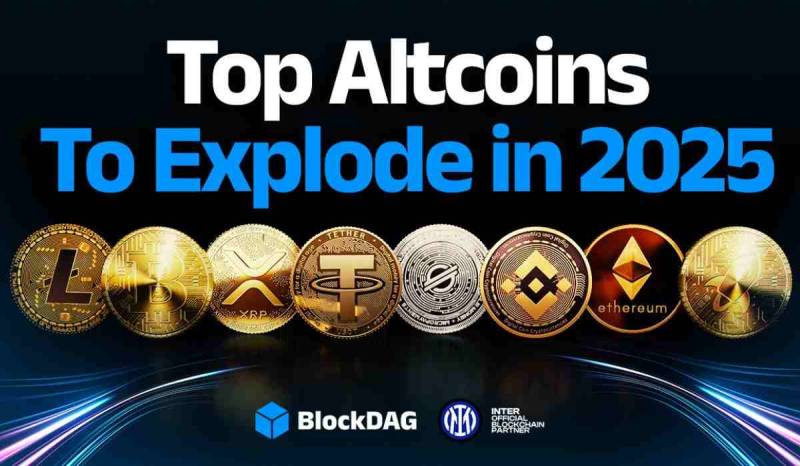 |
|
 |
|
 |
|
 |
|
 |
|
 |
|
 |
|
 |
|
 |
|
 |
|
 |
|
 |
|
 |
|
 |
|
 |
|
Cryptocurrency News Articles
Decentralized Finance (DeFi): A Revolution Rooted in Empowerment
Jan 23, 2025 at 01:30 am
The world of finance is undergoing a seismic shift, driven by the rapid digitization of our societies. At the heart of this transformation lies decentralized finance (DeFi), a technology-driven revolution that is redefining access, equity, and inclusion for billions of people. Its promise? To democratize financial systems by dismantling traditional barriers and empowering individuals to control their financial destinies.
The core of this revolution is a simple yet profound idea: everyone deserves financial freedom. With blockchain technology as its foundation, DeFi is providing the tools that allow anyone with an internet connection to participate in the global economy, irrespective of geographic location, socioeconomic status, or institutional affiliation.
To fully grasp the significance of DeFi, we must first understand the inefficiencies and inequities that plague traditional financial systems, excluding billions from accessing essential financial services. According to the World Bank:
- 1.7 billion adults remain unbanked, lacking access to basic financial services.
- An estimated 400 million small businesses are financially underserved, hindering their growth potential.
- Remittances, a lifeline for many families in developing countries, are subject to high fees and slow processing times.
For these individuals, opportunities to save, invest, and build wealth are severely limited, perpetuating cycles of poverty. The centralized nature of traditional finance, while effective in certain contexts, has proven inadequate for addressing the needs of the marginalized. Decentralized finance emerges as a disruptive solution, challenging the status quo with innovation and inclusion.
What Makes Decentralized Finance Revolutionary?
DeFi reimagines financial systems by leveraging blockchain technology to decentralize control and remove intermediaries. This fundamental shift empowers users to transact, save, and invest without relying on banks or financial institutions. Key features driving this transformation include:
1. Accessibility
Unlike traditional banks, decentralized platforms require only an internet connection and a digital wallet to get started. There are no geographic restrictions or minimum balance requirements, making DeFi especially impactful in regions where physical bank branches are scarce.
2. Autonomy
DeFi puts financial control in the hands of individuals. Users retain full ownership of their funds and are not subject to account freezes, hidden fees, or bureaucratic delays. This level of autonomy empowers individuals to make financial decisions that best suit their needs.
3. Transparency
Blockchain’s public ledger ensures that all transactions are traceable and immutable. This fosters trust and accountability while reducing opportunities for fraud and corruption. Everyone can verify the authenticity of transactions, promoting confidence in the system.
4. Efficiency
Traditional cross-border transactions can take days and incur significant fees. DeFi streamlines the process, enabling near-instant transfers with minimal costs. This efficiency is particularly beneficial for migrants sending remittances to their families back home.
5. Financial Sovereignty
For those living in regions plagued by unstable currencies or inflation, centralized financial systems can erode the value of their savings. Decentralized systems, on the other hand, provide a stable alternative for preserving value, empowering individuals to protect their financial futures.
Real-World Impact: Empowering Individuals
DeFi's potential is more than theoretical. Across the globe, real-world applications are transforming lives in tangible ways:
1. Cross-Border Payments
Cryptocurrencies like Bitcoin and stablecoins are revolutionizing remittances. In countries like El Salvador, migrants use Bitcoin to send money home at a fraction of the cost, bypassing traditional remittance services that charge exorbitant fees. These savings directly impact the well-being of families relying on these funds.
2. Microloans and Lending
Decentralized platforms such as Aave and Compound enable users to borrow and lend without intermediaries. These systems use smart contracts to automate processes, reducing costs and improving accessibility for underserved borrowers. Microloans can be a lifeline for small businesses and entrepreneurs, enabling them to grow their ventures and contribute to local economies.
3. Savings and Investments
DeFi platforms offer high-yield opportunities through staking and liquidity pools, allowing users to grow their wealth in ways that were previously unavailable to them. These opportunities can help individuals build financial resilience and secure their futures.
4. Humanitarian Aid
Blockchain ensures transparency in distributing aid. Organizations can send funds directly to recipients, minimizing the risk of mismanagement or corruption. This efficient and secure system ensures that aid reaches those who need it most.
5. Entrepreneurship
DeFi supports small businesses by providing access to capital. Entrepreneurs in developing regions can leverage decentralized platforms to fund and grow their ventures, driving innovation and economic growth at the grassroots level.
Challenges to the Revolution
Despite its transformative potential, the decentralized finance movement faces several significant challenges that must be addressed to ensure its sustainability and widespread adoption:
1. Technological Barriers
Access to reliable internet and affordable devices remains a challenge in many developing regions. Digital literacy is another critical hurdle to widespread adoption. Without addressing these barriers, many individuals will be unable to fully participate in the decentralized financial ecosystem.
2. Volatility
The price instability of cryptocurrencies like Bitcoin can deter adoption, especially among risk-averse users. Stablecoins, which are pegged to fiat currencies,
Disclaimer:info@kdj.com
The information provided is not trading advice. kdj.com does not assume any responsibility for any investments made based on the information provided in this article. Cryptocurrencies are highly volatile and it is highly recommended that you invest with caution after thorough research!
If you believe that the content used on this website infringes your copyright, please contact us immediately (info@kdj.com) and we will delete it promptly.
-

- BlockDAG (BDAG) picks up speed, launching $30m grants program and partnering with SpaceDev to shape the next era of blockchain.
- Apr 11, 2025 at 10:10 am
- Learn what's shifting in Ethereum analysis, what's behind PI coin's fall, and how BlockDAG's SpaceDev deal and $30m grants shape the next era of blockchain.
-

-

-

-

-

-

- BlockDAG (BDAG), Litecoin (LTC), Filecoin (FIL), and Tron (TRX) Are Some of the Best Crypto Projects for 2025
- Apr 11, 2025 at 09:55 am
- Searching for the best crypto project for 2025 can be like hunting for treasures. While many initiatives appear and vanish, a select few exhibit remarkable durability.
-
![Bitcoin [BTC] Topped $88K After Trump's 'Less Severe' Tariff Plans Bitcoin [BTC] Topped $88K After Trump's 'Less Severe' Tariff Plans](/assets/pc/images/moren/280_160.png)
-

- BlockDAG (BDAG), StratoVM ($SVM), Solana (SOL), and Kaspa (KAS) Rank Among the Best Long-Term Cryptos to Buy the Dip
- Apr 11, 2025 at 09:50 am
- The market continues to shift, with popular coins seeing price drops due to recent global economic challenges. This has led many traders to shift focus to newer projects

















![🐢Super Mario World Koopa Troopa 100% 96⭐️ + Coin [Ao Vivo] 🐢Super Mario World Koopa Troopa 100% 96⭐️ + Coin [Ao Vivo]](/uploads/2025/04/10/cryptocurrencies-news/videos/super-mario-koopa-troopa-coin-ao-vivo/image-1.webp)









































![Bitcoin [BTC] Topped $88K After Trump's 'Less Severe' Tariff Plans Bitcoin [BTC] Topped $88K After Trump's 'Less Severe' Tariff Plans](/uploads/2025/03/26/cryptocurrencies-news/articles/bitcoin-btc-topped-k-trump-severe-tariff-plans/img-1_800_480.jpg)
